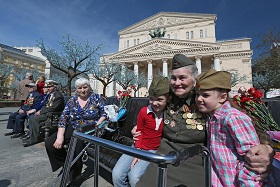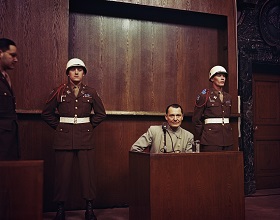In May 2015, humankind celebrated the anniversary of a glorious event – the victory over fascism. However, this date is also significant for another reason. For 70 years, the people have lived without a major (read: world) war. Local conflicts do, unfortunately, break out here and there, taking lives and bringing social and economic breakdown and animosity. But the fact that we have gone almost three quarters of a century without a global war is testament to the world’s nations and their leaders.
Just how have we managed this? Maybe it’s sheer luck. Or are there certain factors that have allowed us, one decade after another, to avoid armed conflict on a global scale? And if this is the case, then what exactly are these factors? And what can we do to make sure that global peace is maintained (or a major prevented) in the future?
It is entirely possible that humankind got “lucky” somewhere along the way. But, as we all know, “luck” is also made. But seriously, global peace was “won” (if we allow ourselves such a paradoxical formulation) thanks to the efforts of a number of people: politicians, diplomats, scientists, military figures, engineers, ordinary workers, artists… The great German philosopher Immanuel Kant argued that peace does not come about by itself. “A state of peace among men who live side by side is not the natural state (status naturalis), which is rather to be described as a state of war: that is to say, although there is not perhaps always actual open hostility, yet there is a constant threatening that an outbreak may occur. Thus the state of peace must be established.” [1]
That lasting peace does not come about by itself was understood not only by philosophers, and not only during Kant’s time. The mass movements in dozens of countries (including the United States, the Soviet Union, Germany, France, etc.) to preserve peace after the Cold War set in are still remembered today. And this wasn’t by accident or coincidence. The horrors of the Second World War were still fresh in the memories of millions of people. And the threat of another global conflict breaking out caused greater fear than even they could have anticipated: a new world war would be nuclear in nature, and this would mean the end of humanity. I believe that this collective historical memory was one of the driving factors behind the prevention of a new world war.
A Bridge between the Past and the Present
Memory is the mental reproduction of a past experience, a symbolic reconstruction of the past in the present, a transmission of values and meanings from generation to generation [2]. By linking past experiences with the present, memory makes it possible to utilize these experiences in current actions and plan for the future [3].
This also applies to so-called “historical memory” – individual and collective, national and universal; memory of events in the distant and not-so-distant past that determine the course of individual, national and world history and that to some degree affect the destiny of humankind; memory of actions that convince us not only of the wisdom of homo sapiens, but also of their stupidity and short-sightedness.
The tragic events of war are forever etched in the memories of those who took up arms in the Second World War. But the memory of those times, the grief and hardship they entailed, were also carried for the rest of their lives by the millions who toiled at home in the name of the war effort, waiting desperately for news from the front line. Memories of war will always remain among those men and women (myself included) who were children during the first half of the 1940s. None of these people (with the exception of the revanchists) had any interest in a new world war breaking out – not the Germans, not the French, not the Poles, not the Americans… And certainly not the Soviet people. And they repeated like a mantra: “Just don’t let there be war…” This psychological frame of mind, dictated by historical memory, is another factor that has prevented World War III from breaking out.
I think that a vital role was also played by the fact that countries such as the Soviet Union, the United States, France and a number of other countries were led by politicians who knew first-hand what war was: Nikita Khrushchev, Leonid Brezhnev, Dwight D. Eisenhower, John F. Kennedy, Charles de Gaulle… Who knows, perhaps the personal memories of the war of the U.S. and Soviet leaders played served as a deterrent when, at the height of the Cuban Missile Crisis, Lieutenant General Khrushchev and Lieutenant Kennedy seemed as though they were ready to cross the “red line”.
The leaders of today’s “nuclear club” countries do not have this memory of world war, at least not through personal experience. And neither do the military officials who surround them. In fact, the majority of people living on the planet today do not have direct memory of the Second World War. This is where universal and national historical memory should come in to save the day.
Never Forget
We do not have the right to forget the inhumane and destructive nature of fascism (I am talking about fascism in the wider context, encompassing fascism itself, as well as Nazism), its role in the militarization of Europe and dragging the world into war.
Today we can see localized instances of groups being formed that have adopted fascist symbols and ideas as their own, practice the cult of brute force, and at times openly call for the establishment of orders that embody fascist ideals. The alarmed public is often reassured thus: these are small groups that have formed spontaneously; they have very little influence and should not be taken seriously. This is dangerously short-sighted (if not an outright criminal lie)! History has shown us that if you don’t put an immediate stop to those who have turned to fascism, then they are capable of garnering the support of the right-wing political elites and hordes of disenchanted ordinary civilians, multiplying like germs and quickly becoming an influential political force, with all the fatal consequences that that would entail.
We cannot allow ourselves to forget the dangers of nationalism and chauvinism, which have increasingly manifested themselves in recent times in different corners of the globe and given rise – among other things – to some nations imposing (including by force) their values and ideals onto others. This can only provoke a response, and this response is sometimes very violent indeed.
We cannot keep silent about the dangers of this new wave of Russophobia, which has been drummed up by the United States and its obedient lap dogs in the European Union. The West has been afflicted with this illness for over a century. And while it may have fluctuated over the years depending on the political, economic and military situation, it has never disappeared completely. The current spike in anti-Russian sentiment harms both Russia and the West. It provokes fierce resentment of the West among ordinary Russians and pushes the country to seek closer relations with states whose economic and political growth frightens the West. And it would do Western politicians good to remember that if it weren’t for Russia (or the Soviet Union), Europe and the United States would have been unable to defeat Hitler’s war machine, just as today lasting peace is impossible without constructive cooperation with Russia.
We must not forget that racial and ethnic hatred – the insistence of those who preach such twisted values and believe that they are somehow a “special” part of humanity – eventually leads to the desire to remove “unacceptable” peoples from the face of the earth “once and for all”. It leads to the destruction of society, the creation of death camps, the deportation of hundreds of thousands of people and genocide. In recent months, high-ranking U.S. officials have been talking with increasing frequency about “American exceptionalism”. This is a dangerous claim, fraught, like both nationalism and chauvinism, with a policy that will eventually lead to the disintegration of societies. And a fragmented world is fertile ground for wars to break out.
Cherish the Memory of Past Victories
Historical memory can do more than give warning about certain courses of action. It can also inspire, instil confidence that peace will prevail, and convince you that the seemingly impossible is, in fact, possible if only you put your mind to it. Relations between the United States and the European Union on the one hand and Russia on the other are perhaps at their lowest ebb since the collapse of the Soviet Union. And it may seem at times that any improvement in these relations (or at least, the first steps in this direction) is a long way off. But let us not forget how the anti-Hitler coalition came to be. Only a year or two before its formation, nobody believed that the leaders of the Soviet Union, the United States and the United Kingdom would be able to reach an agreement on allied relations. In the end, the allied forces consisted of dozens of states, including those who had originally fought on the German side. This all goes to show that, given the will and a realization of a common threat, enemies can come together to achieve a common goal. And Russia is not an enemy of the United States or the European Union, despite what some Russophobes would at times have us believe.
Or take the successful cooperation between the nuclear states, which is aimed at the reduction and non-proliferation of nuclear weapons. The negotiation process was long and arduous, but in general it proved that the Soviet Union/Russia, the United States and other powers can come a consensus on matters that are vital not only for their own countries, but also for the whole of humanity.
We have already mentioned the Cuban Missile Crisis, and let us pray that a similar situation does not happen again. But what we did learn from that experience is that reason and humankind’s instinct for survival can lead those who make the most crucial decisions away from the precipice. But we shouldn’t just keep this in mind and then tempt fate by repeating the same “experiments”.
So We Don’t Forget…
Historical memory is not inherited. So we can’t let people forget; we need to teach them, introduce new generations to the past in one way or another. In Ukraine, vandals are demolishing statues to Soviet military commanders. But shameful things happen here in Russia as well. Recently, I read about a group of teenagers who baked potatoes on the eternal flame in their village, and then burnt wreaths that had been laid on the monument commemorating May 9. The police detained the hooligans and gave them a “history lesson”. Many thanks to the Old Bill. But I find it hard to believe that they had never been told about the Great Patriotic War and the price that the Russian people, perhaps their grandfathers, paid for victory. Of course they had. The problem is that they hadn’t been told with any kind of conviction. Either that or the story of the Second World War simply fell on deaf ears. Deaf ears because the words had no resonance for them. The historical memory of a nation is felt more acutely in people who have a personal memory or experience of that history. This is why the Immortal Regiment march on the 70th anniversary of the victory over fascism, which saw thousands upon thousands of people holding portraits of loved ones who had fought on the front line during the Second World War, was both inspired and eye-opening.
Another important thing. We have a moral obligation to guard the real facts of the past – the very foundation of our historical memory – from falsification. The task is even more urgent given the attempts that are taking place before our very eyes of certain parties to rewrite the history of the Second World War and distort it for the sake of their own political interests. Putting an end to this is also one of the objective conditions for preventing another major war.
1. Kant, I. Collected Works in 8 volumes. Volume 7, Moscow: 1994, p. 13. The italics are in the original text.
2. See Petrovsky A., Yaroshenko, M. (eds.), Psychology. Dictionary. Moscow, 1990, p. 264; Yarskaya, V., Yarskaya-Smirnova (eds.), The Power of the Times: The Social Boundaries of Memory. Moscow, 2011.
3. Petrovsky A., Yaroshenko, M. (eds.), Psychology. Dictionary. Moscow, 1990, p. 264.







